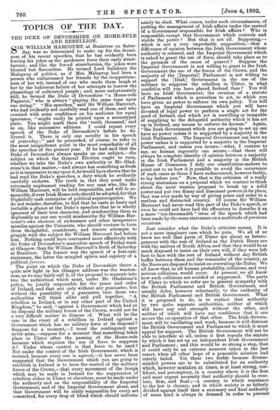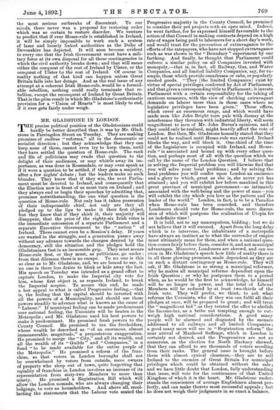• TOPICS OF THE DAY.
THE DUKE OF DEVONSHIRE ON HOME-RULE AND REBELLION.
SIR WILLIAM HARCOURT, at Braintree on Satur- day, was so determined to make up for the dreari- ness of his recent speeches, that he has evidently been forcing his jokes as the gardeners force their early straw- berries ; and like the forced strawberries, the jokes were bloated but flavourless. He termed Lord Salisbury the Malaprop of politics, as if Mrs. Malaprop had been a person who embarrassed her friends by the inopportune- ness of her wit, instead of one who made them laugh at her by the ludicrous failure of her attempts to borrow the phaseology of cultivated people ; and, more unfortunately still, he termed the Duke of Devonshire "a Home-rule Paganini," who is always "playing the same tune upon one string." "His speeches," said Sir William Harcourt, who had evidently not carefully read one of them, and who counted with some confidence on his audience for equal ignorance, "might really be printed upon a stereotyped plate. You might mark them the tenth thousand,' and so on, like successive editions. I could repeat every speech of the Duke of Devonshire's before he de- livered it. There is only one novelty in his speech of yesterday ; " and he proceeded, of course, to refer to the most insignificant point in the most remarkable of all the speeches of the present year. If he had said that the Duke of Devonshire always speaks on one subject,—the subject on which the General Election ought to turn, whether we take the Duke's own authority or Mr. Glad- stone's in that matter,—and always has something as fresh as it is impressive to say upon it, he would have shown that he had read the Duke's speeches, a duty which he evidently carefully eschews. The truth is, that they must make extremely unpleasant reading for any man who, like Sir William Harcourt, will be held responsible, and will be re- sponsible, if ever Irish Home-rule should be adopted, for that frightfully rash enterprise of political supererogation. We do not wonder, therefore, to find that he casts so hasty and irritable a glance at the Duke's speeches that he is wholly ignorant of their true character, and misdescribes them as deplorably as any one would misdescribe Sir William Har- court's own showers of nicknames and other inexpensive missiles against the Unionists, who should venture to term them thoughtful, considerate, and sincere attempts to grapple with the subject Sir William Harcourt had before him. Nothing could have contrasted more effectively with the Duke of Devonshire's masculine speech of Friday week at Glasgow, than Sir William Harcourt's froth of Saturday at Braintree. The former was the speech of a first-rate statesman, the latter the mingled spleen and cajolery of a political farceur. The point on which the Duke of Devonshire threw a quite new light in his Glasgow address was the wanton- ness, as we may fairly call it, of the proposal to separate into two the authorities which must, under Mr. Gladstone's policy, be jointly responsible for the peace and order of Ireland, and that not only without any guarantee, but without the possibility of a guarantee, that these two authorities will think alike and pull together. "A rebellion in Ireland, or in any other part of the United Kingdom," he said, "against a Government which had at its disposal the military forces of the Crown, would not be a very difficult matter to dispose of. What will be the case in the event of a rebellion in Ireland against a Government which has no military force at its disposal ? Suppose for a moment,—I trust the contingency may never arise,—suppose for a moment that something takes place in Ulster after the passing of the Home-rule measure which requires the use of force to suppress it ? Under whose control is that force to be used ? Not under the control of the Irish government, which is resisted, because every one is agreed,—it has never been suggested that the Government which you are going to establish in Ireland is to have the control of the military forces of the Crown,—that every movement of the troops which may be made in Ireland for the suppression of rebellion either in Ulster or elsewhere, must be made under the authority and on the responsibility of the Imperial Government, and of the Imperial Government alone, and that Government will be solely responsible for every act committed, for every drop of blood which should unfortu- nately be shed. What comes, under such circumstances, of putting the management of Irish affairs under the control of a Government responsible for Irish affairs ? Who is responsible except that Government which controls and wields the power ? But that is not all. Supposing,— which is not a very improbable supposition,—that difference of opinion between the Irish Government whose authority is resisted, and the Imperial Government whieh is asked to grant the use of force, should take place as to the grounds of the cause of quarrel ? Suppose the Imperial Government is not willing to grant to the Irish Government the use of the forces of the Crown, and the majority of the [Imperial] Parliament is not willing to support the [Irish] Government in the use of the military to suppress the rebellion in Ulster, in what condition will you have placed Ireland then You will have an Irish Government, the creation of a statute of Parliament which is powerless to act, to which you have given no power to enforce its own policy. You will have an Imperial Government which you will have divested of legal power to perform a single act for the good of Ireland, and which yet is unwilling or incapable of supplying to the delegated authority which it has set up in Ireland, any means to enforce its decrees." Again, "the Irish Government which you are going to set up can have no power unless it is supported by a majority in the Irish Parliament. The Imperial Government can have no power unless it is supported by a majority in the Imperial Parliament, and unless you secure,—what, I venture to say, no human ingenuity can secure,—that there will always be complete identity of opinion between a majority in the Irish Parliament and a majority in the British. House of Commons, I defy our constitution-makers to. point out to us how it is possible to avoid the occurrence of such eases as those I have endeavoured, however feebly,. to lay before you." Now, that is the criticism of a really strong statesman on a proposal which we venture to think about the most wanton proposal to break up a solid. power and put two flimsy and dissonant powers in its place, that was ever made by way of giving peace and order to a,. restless and distracted country. Of course Sir William Harcourt had never read this part of the Duke's speech, or even he could not have had the effrontery to describe it as a mere " ten-thousandth " issue of the speech which had been made by the same statesman on a multitude of previous occasions.
Just consider what the Duke's criticism means. It is not a mere imaginary case which he puts. We all of WI know too well that parts of Ulster are about as hetero- geneous with the rest of Ireland as the Dutch Boers are with the natives of South Africa, and that they would be as much disposed to insist on their own will, if they were left face to face with the rest of Ireland without any British buffer between them and the remainder of the country, as. the Boers are disposed to insist on overruling the Zulus. We all know that, in all human probability, collisions, and very serious collisions, would occur. At present, we all know how such collisions are avoided or suppressed. The parts of Ulster to which we refer are in general sympathy with the British Parliament and British Government, and usually defer, however reluctantly, to the authority of the British Parliament and British Government. What it is proposed to do, is to replace that authority by two quite separate authorities, neither of which will have any real strength without the other, and neither of which will have any confidence that it can secure the co-operation of that other. The Irish Govern- ment will be vacillating and weak, because it will distrust the British Government and Parliament to which it must appeal for support. The British Government will not be able to interfere at all, unless it first repeals the statute by which it has set up an independent Irish Government and Parliament; and this would be so strong a step, that it could only be an extreme measure taken in the last resort, when all other hope of a peaceable solution had utterly failed. Yet, these two feeble because diverse- minded powers are to be substituted for an authority which, however mistaken at times, is at least strong, con- fident, and peremptory, in a country where it is the first and most urgent necessity that authority should be reso- lute, firm, and final ;—a country in which resistance to the law is chronic, and in which society is so bitterly divided against itself that a summary and final authority of some kind is always in demand in order to prevent the most serious outbreaks of discontent. To our minds, there never was a proposal for restoring order which was so certain to restore disorder. We venture to predict that if ever Home-rule is established in Ireland, it will be simply impossible to work such a system of lame and loosely linked authorities as the Duke of Devonshire has depicted. It will soon become evident to every one that the Irish Government must have a mili- tary force at its own disposal for all those contingencies in which the civil authority breaks down ; and that will mean either the conquest of the rest of Ireland by Ulster, or the conquest of Ulster by the rest of Ireland. Of course in reality nothing of that kind can happen unless Great Britain falls into her dotage. And as the real issue of any attempt at a coherent Irish Home-rule, would be a formid- able rebellion, nothing could really terminate that re- bellion, except the reconquest of Ireland by Great Britain. That is the grim result in which Mr. Gladstone's enthusiastic provision for a "Union of Hearts" is most likely to end, if it ever gets fairly under weigh.



































 Previous page
Previous page